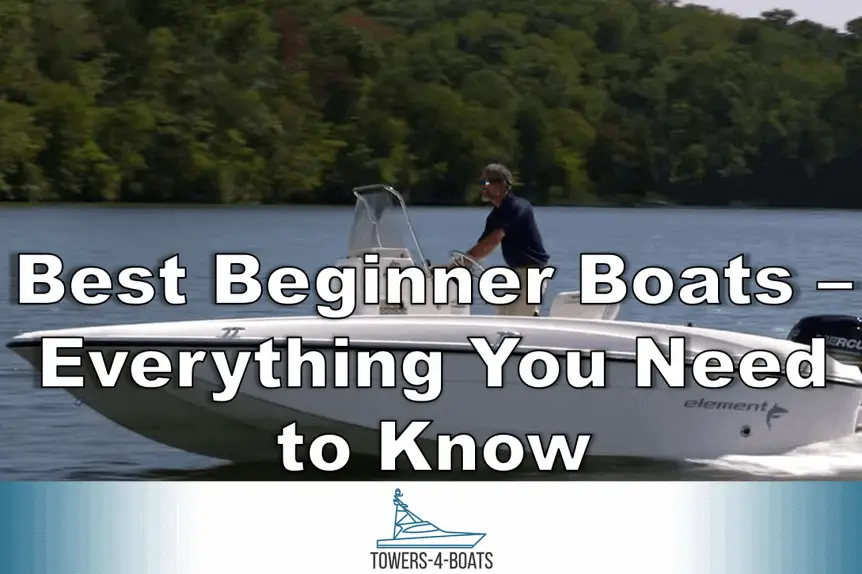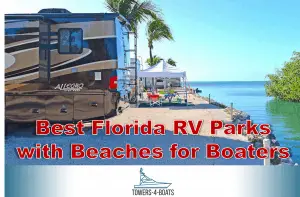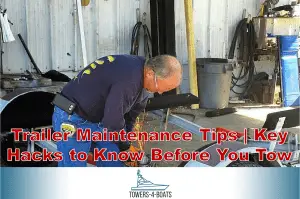How to Select the Perfect First Boat
Getting into boating for the first time is an exciting journey. Picking your first boat can be one of the toughest choices you have to make, and, unfortunately, many people get it wrong. Buying the wrong boat can be a costly mistake and affect your enjoyment of the boat.
Many factors go into choosing the perfect boat for you and your family. Budgeting for the purchase and refit is just the beginning. Finding the right boat for you can be a challenge, even after you’ve picked out the make and model you want. Here’s a look at just a few of the things you should consider.
Check out my article on the best ski boat.
Remember, Boats are Not Assets
Your goal when buying your first boat is to get the best value while being realistic about your timeframe. To do that, you need to understand a few points about boats.
Firstly, boats will cost you money, and they will lose value. They sell very slowly, and they depreciate quickly. This is, of course, a generalization, but it’s a rare boat that holds its value, remains in steady demand, and sells quickly.
Secondly, used boat prices are tough to pin down. Used boats seldom sell at asking price, but how much they do sell for is something of a mystery. Boat brokers take ten percent off of the sales price, so often, brokerage boats will be more expensive than FSBO listings.
The most important trap to avoid is the lure of the project boat. Project boats can be dream killers. Many people have tried to become boaters by purchasing the boat of their dreams, getting a “deal” on a boat that “just needs some TLC.” At first glance, the price might make a project boat sound appealing. But projects boats are just what they claim to be, and not many ever become anything else. Even the handiest of DIYers can get in over their heads.
Unless you are dedicated to spending a lot of money and time on a project boat, you’re better off to find a boat in good mechanical condition and paying more for it up-front. You might have to get a smaller boat to stay within your budget, but you will spend far more time boating and far less time, money, and effort in the boatyard or garage.
The sad truth is that all boats are project boats to some extent. Boats advertised as “sail away” ready seldom are. At the very least, they need outfitting with safety and docking gear and serious cleaning. Essential maintenance, like keeping the bilges clean and staying on top of corrosion, takes serious time. The trick for a new boater is to sort through how much work is too much work.
Budget and Costs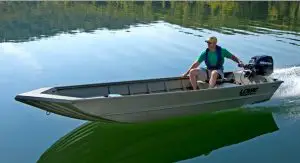
The point is that yes, you can get a bigger boat cheaper. There might even be a newer boat, or a boat with a better motor or more systems, that “just needs a little work.”. The thing that is going to affect your budget more than anything else is the condition of the boat. All boats need some work, but how much are you going to have to invest in getting this boat the way you want it?
For this reason, it is always best to not invest your entire budget into the purchase price of the boat. If you have $10,000 put away for your boat, consider looking for boats that sell for around half that. Put that other half towards outfitting the boat, investing in new equipment, and having fun enjoying it. Keep a chunk of that money for a rainy day when something big breaks. The same rule of thumb works just as well if you want to spend $5,000 or $75,000.
Other expenses you’ll have are not unlike buying a car or home. Insurance, sales tax, and registration fees all apply. Some counties and states charge personal property tax on vessels. Before you buy, you’ll want to figure out where to keep the boat and how much that will cost.
Operating costs are variable depending on the type of boat. Sailboats may sip gas or diesel, and you can top off the tank once a year. Go-fast boats might fill up for several thousand dollars every week. Online research of the type of boat you want should reveal approximate fuel consumption numbers, and it’s easy to find out how much fuel sells for at your local fuel dock. If the boat is kept in the water, expect more maintenance and upkeep costs to keep the bottom clean and corrosion under control.
Engines will need oil changes and servicing at least every 100 hours or every six months. If you live in areas where freezing weather is possible, you’ll have to winterize the boat. These are simple maintenance tasks you can learn to do yourself for the cost of supplies, most of which you can pick up at Wal-Mart.
If you are planning on hiring people to do the work for you, expect to pay your help between $60 and $120 per hour, depending on where you live and the task in question. Expect the job to take two or three times as long as you think it should. Whenever you get an estimate for work to be done, know that it will likely be double that amount in the end. And never hire help that you don’t have a personal recommendation for, no matter how professional the shop may appear. Hiring outside help for your boat is the most significant variable cost you will encounter in boating. Everyone must employ a professional from time to time, but if you’re on any sort of budget, it must be approached carefully.
Picking the Perfect Boat
Most boat shoppers have their eye on at least a rough outline of the boat they want. Is it a sail or power boat? Is it for use on lakes, bays, or the open ocean? Will you use it for fishing or diving? Does it have an enclosed cabin? Will you stay overnight aboard, and if so, how often? For powerboats, do you want to go fast, or is hull speed sufficient? Is draft an issue in the areas you cruise? There are many questions you can ask to help narrow down the choice. All of these are personal choices, but here’s a rough rule of thumb you can apply.
The more versatile the boat you choose, the more use you will get out of the boat. For example, let’s say you live in Florida and are shopping for a trailerable powerboat. You live near a lake and want to fish there, so you’ve had your eyes on a fast, low-profile bass boat. But the ocean is nearby too, and you’d like to visit some sandbars or maybe even try your hand at offshore fishing and diving. By broadening to scope, you might realize that a 17 to 19-foot center console would fit the bill better. It can easily be used in the lake, but it can also safely be used in good weather on the ocean. It trailers and operates just as well as the bass boat, but you can use it in many more ways.
Things to Look for in the Perfect Boat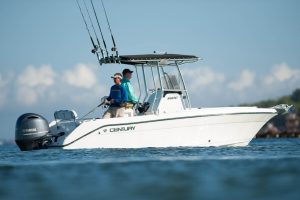
Of course, now that you’re looking, you realize that there are several dozen manufacturers of center console boats (read more). They all have various reputations ranging from horrible to mystical, and they all look identical. How do you pick the one for you?
Generally, the better the boat is designed, then the easier owning the boat will be. Ease of operation is what quality manufacturers build in. Low-quality manufacturers build in ease of manufacture. What this means is that simple tasks like replacing a wire, servicing a bilge pump, or fixing a leak are all extremely difficult if the design doesn’t allow you access the parts of the boat you need to get to. All too often, manufacturers install equipment in the hull, then attach the deck to the hull, thereby making that equipment inaccessible to the future user.
The best thing you can do is see as many various boats as you can and compare them. Open every locker and every compartment. Can you get to every part of the boat easily? Spend some time aboard and imagine yourself lounging and relaxing. Is it comfortable? Now imagine yourself changing the oil. Can it be done quickly and easily? What if you wanted to install a new chartplotter? How hard would it be to run a wire from the electrical panel to the helm?
Once you’ve identified the manufacturers that you like that are within your budget, it’s time to pick the actual boat. Now is the time to start worrying about the cosmetic and mechanical condition, how many repairs, and how much equipment is necessary to get it ready to go.
Surveys or Mechanical Inspections
If you are considering purchasing a vessel for the first time, a survey is a must. Just as when you purchase a home, you must invest in a home inspection, so too must you invest in a vessel survey. Surveyors go over every system of the boat and check the integrity of the hull. They are familiar with common problems and know what to look for. Most insurance policies are going to require seeing a current survey on larger boats.
Small boats typically don’t get surveyed, but it’s still vitally important that you get it inspected by a marine mechanic that you trust. The unfortunate truth is that there are a lot of trash project boats on the market and very few in good condition. The money you spend now to have an outside opinion about the boat can save you thousands of dollars and years of aggravation. If a broker is selling the boat, be sure to employ your help that is completely independent from the broker or dealership you are dealing with.
Consider Engaging a Buyer’s Broker
All of this probably sounds like a lot to take in. Purchasing your first boat should be fun and exciting, the fulfilling of a long-time dream. No one wants to make big mistakes and lose a lot of money. And no one wants to buy a project boat accidentally.
A trustworthy buyer’s broker can help. Look for one who is experienced with the sorts of boats you want to buy, and who is knowledgeable about the brands you like. Their experience can be invaluable. They can also access previous sales data to get you a much clearer idea of how much the boats you are looking at are worth. They should even know trustworthy mechanics or surveyors that can give you the real scoop on the condition of the boat.
Just like with real estate agents, be careful about how you engage with a broker. If you contact a broker about a specific boat listing, they are representing the seller and trying to move that boat. If you look specifically for a buyers broker, they will work for you. Make sure to get this in writing and interview several brokers to find the right one for you. Some may collect a fee upfront, while others will collect a percentage of the sale. Either way, make sure it is clear that they are representing you, and be skeptical if they are only showing you their listings.
Conclusion
One of the most exciting things about boating is the number of ways we use our boats. With so many designs and so many ways to use a boat, picking the boat for you can be a difficult task.
Boating is a magical thing, and once you’ve found the right boat for you, all of this will be worth it. Take your time, don’t rush into anything, and enlist the help of a professional if you need it. See you out there on the water!

